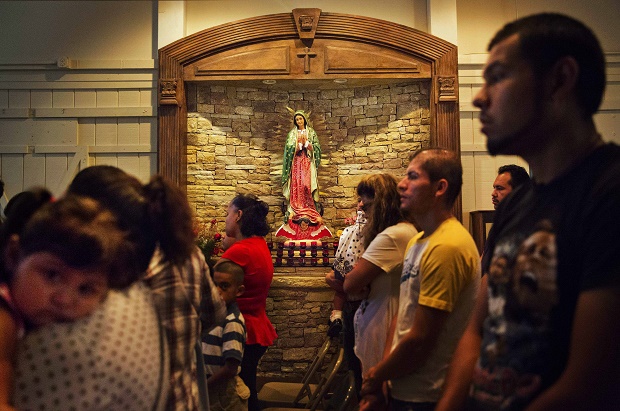Pope to find US Church losing Latinos to Evangelicals

Worshippers pray next to a shrine to Our Lady of Guadalupe, the patroness of the Americas especially revered by Mexicans, during Mass at the St. John Paul II Pastoral Center in Gainesville, Georgia, on Sunday, Aug. 9, 2015. The Roman Catholic mission sits at the rough end of a former strip mall in the shadow of an Arby’s. The space, church leaders say, was once used as a nightclub and movie theater, a history now hidden by multiple coats of paint, pews brought in from other congregations, and a stone-and-wood shrine to Our Lady of Guadalupe. AP
GAINESVILLE, Georgia, United States — The St. John Paul II Pastoral Center, a Roman Catholic mission, sits at the rough end of a former strip mall in the shadow of a chain sandwich shop. The space, church leaders say, was once used as a nightclub and movie theater, a history now hidden by multiple coats of paint, pews brought in from other congregations, and a stone-and-wood shrine to Our Lady of Guadalupe, the patroness of the Americas especially revered by Mexicans.
This mission, in the Archdiocese of Atlanta, was built in a hurry, to serve the many Latinos who labor at the poultry processing plants that form the economic backbone of Gainesville. On a recent Sunday, worshippers spilled onto the sidewalk in rows two and three deep, and by the end of the weekend, 5,000 people had attended Mass here.
Evangelicals have set up shop here, too. Georgia is Baptist country and a Bible Belt stronghold where Catholics had a small footprint until the latest immigration boom. The Rev. William Canales, the cherubic, Nicaraguan pastor of the mission, noted with a twinkle in his eye that a Protestant preacher in the same mall had recently moved on.
“The Catholic Church in Gainesville — we are waking up now,” Canales said, on the eve of the first visit to the United States by Pope Francis, the first Latin American pontiff.
Francis will arrive in the U.S. on Sept. 22, carrying the hopes of many for what he might do for American Catholicism. But few of these goals have as much urgency for church leaders as affirming the place of Latinos in the church and inspiring them to stay in the fold.
Article continues after this advertisementAbout 38 percent of adult Catholics in the U.S. are Latino, according to the CARA research center at Georgetown University, and they are already the majority in several dioceses.
Article continues after this advertisementTheir numbers are increasing at the same time a steady stream of American Catholics overall are leaving the faith. Immigration and the high birth-rate for Latino Catholics have more than made up for the losses, helping the 68-million-member denomination continue to grow.
Yet, Latinos aren’t sticking with the church the way they once did. In 2006, about eight in 10 Latinos who were raised Catholic stayed in the tradition as adults. That figure dropped to seven in 10 last year, according to CARA. Like many Latin Americans back home, U.S. Latinos are joining Pentecostal movements, or abandoning organized religion entirely, in numbers significant enough to raise alarm among U.S. bishops.
Georgia is one of the more dramatic examples. The Catholic population here had been so small historically that the state for decades only had one diocese — in Savannah. The Atlanta diocese was created in 1956 with just 24,000 parishioners.
Now, Peter Faletti, Atlanta archdiocese director of research and planning, is scrambling for space. He has been renting schools, former movie theaters and defunct car dealerships so he can turn them into worship sites. Even so, he says services fill to capacity within weeks. In Lilburn, an Atlanta suburb, Our Lady of the Americas draws 10,000 mostly Latino Mass-goers each weekend and is still growing.
Non-Hispanic professionals relocating to the Atlanta area from the North and Midwest have helped increase Catholic numbers in recent years, but Latinos are the main drivers of the boom. From 2000 to 2011, the Latino population doubled in Georgia, putting the state in the Top 10 for Latino growth in that period, according to Pew.
Latinos and whites each make up about 44 percent of the 1 million members of the Atlanta archdiocese, and Latinos are on track to eventually become the majority.
Los Angeles Archbishop Jose Gomez, the highest-ranking Latino in the U.S. church, whose archdiocese, 70 percent Latino, has been at the forefront of advocating for immigrants, said the role of Latinos “is a big part of the story of the pope’s visit.” In Washington, the pope will canonize 18th-century Spaniard and Franciscan missionary Junipero Serra, who evangelized the territory that would become California. Gomez called the canonization a “historic moment in the life of the Hispanic people” in which the pope is calling on Americans to reflect on “our legacy as immigrants.”
Copyright 2015 The Associated Press. All rights reserved. This material may not be published, broadcast, rewritten or redistributed.
Summary
Date:9/10/2015 5:12 AM
Slug:BC-US–Pope-Latino Boom,1st Ld-Writethru
Headline:Pope will find US church struggling to hold onto Latinos
Source:AP
Byline: RACHEL ZOLL,AP Religion Writer
Byline Title:AP Religion Writer
Copyright Holder:AP
Priority:r (4)
With Photo:
Dateline:GAINESVILLE, Georgia
Editors’ Note:Eds: Edits to correct that Diocese of Savannah, renamed in 1936, had been formed earlier. With AP Photos. For global distribution
Word Count:714
File Name (Transref):W1881
NY861-0809151027
NY862-0809151110
NY863-0809151030
NY864-0809150957
NY865-0809151009
NY866-0809151101
NY867-0809151045
NY868-0809151120
NY869-0809151135
NY870-0811151203
NY871-0813151309
NY872-0813151410
Editorial Type:Lead
AP Category:a
Format:bx